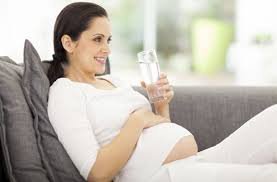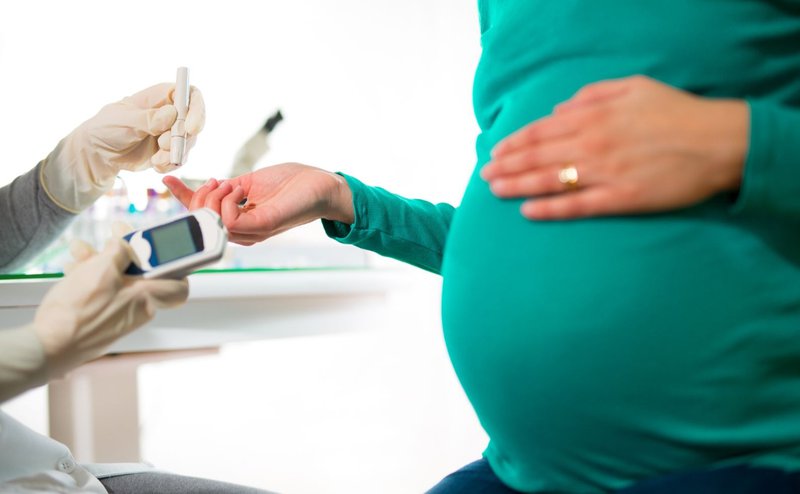How to treat and prevent cramps during pregnancy
A pregnancy cramp is a sudden and involuntary contraction of one or more muscle groups that causes severe pain in the thighs, calves, and legs, often occurring at night in the middle and end of pregnancy. Although generally harmless, cramps can be temporarily immobilized, causing pain during pregnancy that affects sleep and movement.
1. Common causes of cramps during pregnancy
Currently, there is no research on why women often experience cramps during pregnancy. The cause is often not clear. In the field of obstetrics, there are many causes of cramps during pregnancy including the following main causes:
The pregnant woman's body weight increases during pregnancy, putting more pressure on the muscles. muscles in the legs. The growing uterus increases pressure on the main blood vessels that bring blood from the legs to the heart, and the nerves from the spinal cord to the legs, the veins supplying blood to the uterus are also compressed, causing a feeling of heaviness and difficulty. bear. Dehydration causes the body to lose electrolytes causing cramps. Lack of calcium, especially in the last months of pregnancy, the body's need for calcium increases to be able to meet the development of the fetus. When the amount of calcium is not provided adequately, the pregnant mother's body will provide calcium to transmit to the baby, causing the mother to be calcium deficient. Mineral deficiency. Too little potassium, calcium, or magnesium in the diet can contribute to leg cramps. Overuse of muscles, dehydration, muscle strain, or simply holding a position for a long time can cause muscle cramps. However, in many cases, the cause is not known.
The pregnant woman's body weight increases during pregnancy, putting more pressure on the muscles. muscles in the legs. The growing uterus increases pressure on the main blood vessels that bring blood from the legs to the heart, and the nerves from the spinal cord to the legs, the veins supplying blood to the uterus are also compressed, causing a feeling of heaviness and difficulty. bear. Dehydration causes the body to lose electrolytes causing cramps. Lack of calcium, especially in the last months of pregnancy, the body's need for calcium increases to be able to meet the development of the fetus. When the amount of calcium is not provided adequately, the pregnant mother's body will provide calcium to transmit to the baby, causing the mother to be calcium deficient. Mineral deficiency. Too little potassium, calcium, or magnesium in the diet can contribute to leg cramps. Overuse of muscles, dehydration, muscle strain, or simply holding a position for a long time can cause muscle cramps. However, in many cases, the cause is not known.
2. Signs of cramps during pregnancy
Cramps are a common phenomenon in women during pregnancy, often appearing as soon as they begin to sleep. Cramps can start to cause discomfort from the third month of pregnancy and day-to-day pain appear more often as the fetus grows. This condition occurs during the day and is worse at night, greatly affecting the sleep of pregnant women, but leaving no consequences for the mother and will go away on its own at the end of pregnancy. Leg cramps during pregnancy are most common including calves, thighs, feet, especially in the calves. It can also be found on the hands and body. Particularly in the case of abdominal cramps, attention should be paid to the possibility of miscarriage. Besides the sudden, sudden pain, you may also feel or see a hard mass of tissue underneath the skin. In case if a pregnant woman has cramps accompanied by symptoms such as bleeding, strong pain in the abdomen or on the top of the shoulder, increased body temperature or severe pain in the painful part, it is necessary to quickly go to medical facilities to be checked. timely investigation and treatment.

Chuột rút là hiện tượng phổ biến ở phụ nữ trong thời gian mang thai
3. How to cure cramps during pregnancy
If you have leg cramps, stretch the calf muscle on the affected side. Walking and then elevating your legs can help keep leg cramps from coming back. Hot showers, warm baths, ice massages, or muscle massages can also help. If you tend to get leg cramps at night, stretching your muscles before bed with light exercise, such as riding a stationary bike for a few minutes before bed, can also help prevent it. cramps while sleeping. Be positive. Regular physical activity can help prevent leg cramps during pregnancy. Magnesium supplement. Limited research shows that taking magnesium supplements may help prevent leg cramps during pregnancy. You may also consider eating more magnesium-rich foods, such as whole grains, beans, dried fruit, nuts and seeds. Get enough calcium. Some research suggests that a drop in your blood calcium level during pregnancy can contribute to leg cramps. All women, including pregnant women, should get 1,000 milligrams of calcium per day. Consult your doctor to be able to supplement the amount of calcium needed by the body according to each stage of pregnancy. In the daily menu, pregnant women need to pay attention to add calcium-rich foods (meat, fish, eggs, shrimp, crab,...). Drink enough water. Make sure to drink enough water every day. Take time to rest. Always keep your mind at ease and avoid stress. Cramps during pregnancy are very common, so don't worry too much. However, in rare cases, cramps cause severe pain due to blood clots blocking the vessels. If you experience severe and persistent pain along with signs of redness and swelling in your legs, you should immediately visit a doctor for prompt treatment.

Đảm bảo bổ sung nước đầy đủ mỗi ngày
4. Prevent cramps during pregnancy
There are many ways to prevent pregnancy cramps, although the cause is not clear, but the following measures will greatly improve the reduction or loss of pregnancy symptoms that you experience. Prevention measures include:
Avoid standing or sitting for too long in one position. Pregnant women working at the office take advantage of the time to stretch their calves and move their legs after every working hour. Avoid hard work. Maintain a rhythmic and moderate exercise routine. Exercising during pregnancy with light exercises such as yoga, swimming, walking, ... helps the blood volume and metabolism in the mother's body take place more smoothly. Perform massage movements, gently massage from thighs to calves, feet and toes to increase blood circulation. Rest your feet on a high (soft) pillow when lying down. You should lie on your left side for blood circulation throughout the body, especially in the calf area. Shower with warm water. Soak your feet in hot water mixed with a little salt and ginger to prevent cramps at night. Choose the right footwear. Choose shoes with comfort, support, and utility in mind. It can help to wear shoes with a solid heel counter - the part of the shoe that surrounds the heel and helps lock the foot into the shoe. Avoid dehydration. Drink plenty of fluids every day. The amount depends on what you eat, your gender, activity level, weather, health, age, and medications you take. Fluids help your muscles contract and relax and keep muscle cells hydrated and less irritable. During the activity, replenish fluids at regular intervals and continue drinking water or other fluids after you're done. Pregnant women with cramps are not too serious, but with the advice of a doctor, pregnant women can minimize symptoms and have a stable, more secure mentality during pregnancy.
Avoid standing or sitting for too long in one position. Pregnant women working at the office take advantage of the time to stretch their calves and move their legs after every working hour. Avoid hard work. Maintain a rhythmic and moderate exercise routine. Exercising during pregnancy with light exercises such as yoga, swimming, walking, ... helps the blood volume and metabolism in the mother's body take place more smoothly. Perform massage movements, gently massage from thighs to calves, feet and toes to increase blood circulation. Rest your feet on a high (soft) pillow when lying down. You should lie on your left side for blood circulation throughout the body, especially in the calf area. Shower with warm water. Soak your feet in hot water mixed with a little salt and ginger to prevent cramps at night. Choose the right footwear. Choose shoes with comfort, support, and utility in mind. It can help to wear shoes with a solid heel counter - the part of the shoe that surrounds the heel and helps lock the foot into the shoe. Avoid dehydration. Drink plenty of fluids every day. The amount depends on what you eat, your gender, activity level, weather, health, age, and medications you take. Fluids help your muscles contract and relax and keep muscle cells hydrated and less irritable. During the activity, replenish fluids at regular intervals and continue drinking water or other fluids after you're done. Pregnant women with cramps are not too serious, but with the advice of a doctor, pregnant women can minimize symptoms and have a stable, more secure mentality during pregnancy.
Để đặt lịch khám tại viện, Quý khách vui lòng bấm số HOTLINE hoặc đặt lịch trực tiếp TẠI ĐÂY. Tải và đặt lịch khám tự động trên ứng dụng MyVinmec để quản lý, theo dõi lịch và đặt hẹn mọi lúc mọi nơi ngay trên ứng dụng.
Bài viết này được viết cho người đọc tại Sài Gòn, Hà Nội, Hồ Chí Minh, Phú Quốc, Nha Trang, Hạ Long, Hải Phòng, Đà Nẵng.






